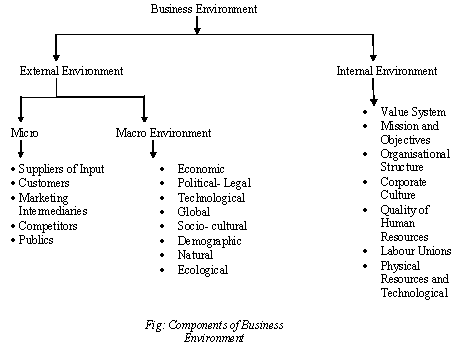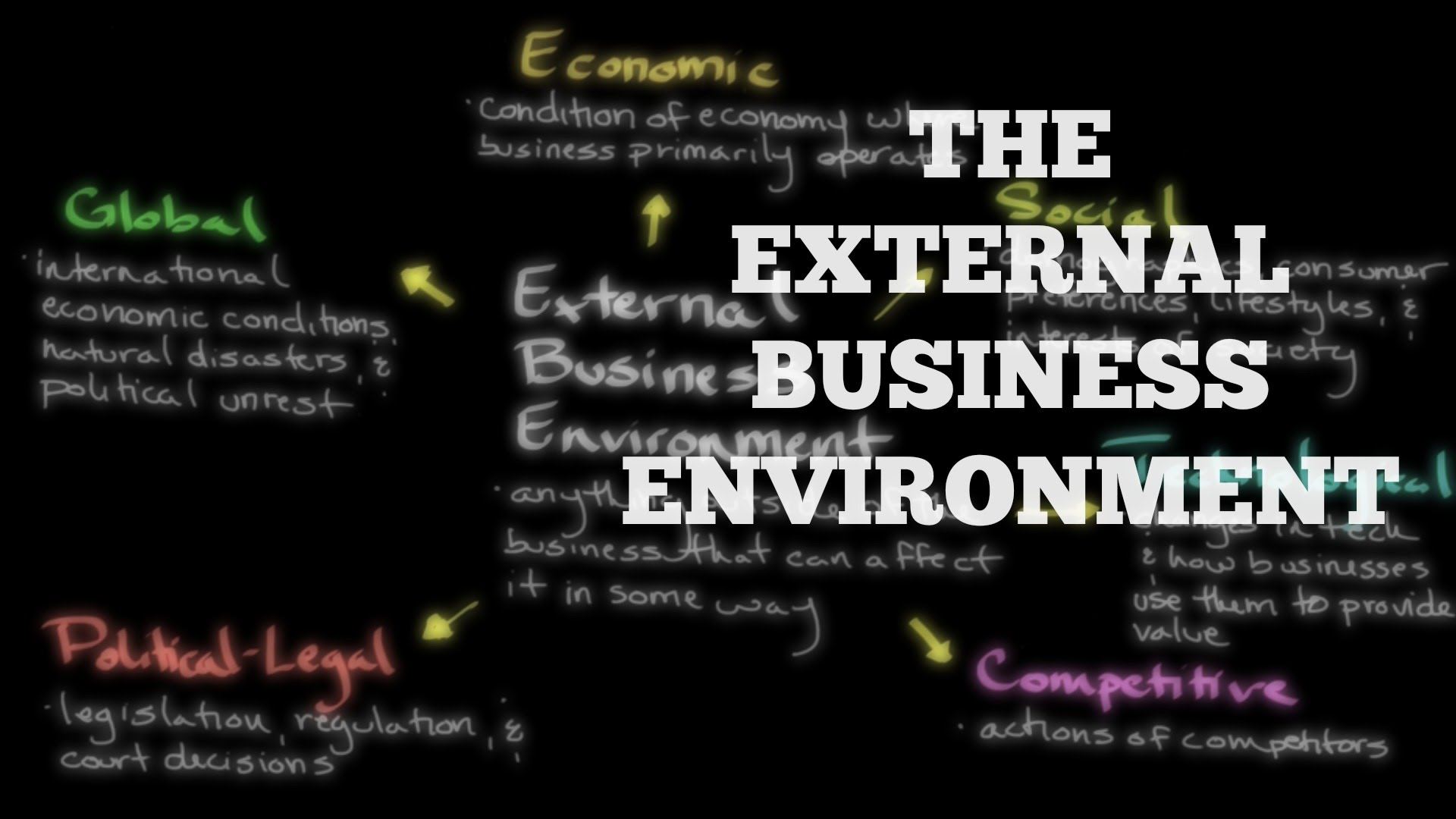Influence of Business Environment on the Success of an Organisation
Generally, the environment refers to the surroundings, external objects, influences or circumstances in which business occurs. As the environment affects an organisation in many different ways, so it is essential for the firms to understand it. Managers must have a clear understanding of the situation of a company so that the company can decide the direction and alter the strategy. Characteristics of the environment are complex, dynamic, multi-faced, and it has far reaching impact.

The business environment is of two types i.e. internal environment and external environment.

Internal environment
Vision and mission
Objectives
Organisational structure
Corporate culture
Quality of human resources
Labor unions
External environment

External environment is sub divided into micro environment and macro environment.
Micro environment:
The players of micro environment do not affect all companies in the industry in the same way. Their decisions and actions often vary in accordance with the size, capability of strategies of each company.
The micro environment of the business is usually affected by the following factors.
Suppliers
An important factor in any firm’s success is determined by its cost of production. This requires that all the time there has to be an assured and uninterrupted supply of raw materials. To face the uncertain conditions and shortage of raw materials companies have to stock more raw materials. In such cases, it naturally puts the financial burden on the company and finally affects the profits. Multiple sources of input suppliers greatly reduce the risk.

Workers and their unions
Workers are vital input in production and it is different from other major inputs. If the workers are organised then they will be in a position to bargain better and these days any policy that disturbs labor peace at the company level may adversely affect its competitiveness. Constant conflict between labor and management will hamper its growth and overtime may transform it into a sick unit.
Customers
Customers are the most important element of the micro environment. Their loyalty to the product depends mainly on the degree of their satisfaction. Nowadays world’s biggest businesses have specific systems for regularly tracking customer satisfaction because it is the ultimate benchmark of the company’s success. Usually, customers do not constitute a homogeneous group they may be individuals, business enterprises, institutions and government. It is always better to have customers from various groups and regions, it maximizes the scope of business.

Marketing intermediaries
Marketing intermediaries in the micro environment are wholesalers, retailers, agents, etc, Most firms find it is very difficult to reach the consumers as they do not have a network to market their products. Distribution firms and agents in such cases render useful service in popularizing a product. In the case of the successful product also market intermediaries are required to face the competitors and to maximize sales.
Competitors
Companies usually do not enjoy the monopoly all the time in the real business world; a firm faces various forms of competition. One of the most common competitions which a firm’s product faces is from differentiated products produced by the other companies. Such a competition is called ‘the brand competition’ and it is seen in the case of almost all durable goods markets. Sometimes companies enjoy the monopoly, because they have control over a substantial amount of the supply of the product.
General public
The public refers to the people, in general, they include consumer protection groups, media persons, environmentalists, etc; these groups by their actions pose a threat to the firms. In democratic societies, public have assumed an important role and their presence in the micro environment is often a threat.
Macro environment:
Economic and non economic factors influence the business activities and those which provide information regarding the various opportunities. The role of the macro environment from the point of view of the business may be both positive and negative. This implies that the larger forces in the firm’s environment do not always provide wider space for business opportunities. The macro environment can be broadly classified into the economic environment and non economic environment.
Since business is basically an economic activity, the national and global economic environment of the business is of strategic importance. In the economic environment of the country’s economic system, macroeconomic scenario, phases of the business cycle, an organisation of the financial system and economic policies are important.
Some factors which contribute towards the non-economic environment are as follows.
Social factors

Business and society have a symbiotic relationship; both of them need and benefit each other. Therefore, business has a social responsibility towards the society in which it exists, society has many social factors like culture, values, tastes, preferences and so on, and all of these must be addressed by the business organisation as business is for the people.
Cultural factors

Every country has a different set of values, beliefs, and customs. These may vary from individual to individual and from region to region. So the business must consider the culture of a community while formulating policies and marketing products.
Economic factors

Business depends on the economy of a country and economic factors like per capital income, money supply, price level, employment generation, etc. Business, therefore, should have all the information required and study the impact of these factors on the business. Economy greatly affects the overall processes of the industries especially from suppliers of raw materials to manufacturer of finished goods. The essential economic indicators include the interest rates, unemployment rates, the consumer price index, the gross domestic product and net disposable income.
Demographic factors
Demographics are considered as the easily measurable elements of the general environment. The demographics act as the basis of several changes in the society. Demographic factors are population, gender ratio, birth rate, mortality rate, the difference in the income levels and geographic distribution of the population. These geographic factors must be considered analytically as they influence the policies of a government regarding the location of industries. Similarly like other segments the effect of a demographic trend also differs throughout the industries.
Technological factors
Technology makes the business simple, each day brings new technology and old ones become obsolete. The government has realized the importance of technology and policies concerning different aspects of the technology have been formed. Business managers should aware of the rapid technological changes to face a severe competition. The technological developments result in new products and services and also determines as to how they are being produced and delivered to the end user. An innovation can develop a completely new industry and can change the boundaries of the existing industries.

Political factors
Business growth depends on the political environmental factors. There always an element of risk associated with these political factors. The risk could be in terms of the type of government in power and its business policies, the perception in matters of foreign investment and how it regulates the market. The political processes and legislation affect the environmental rules which the industries follow. The legislation also provide assistance to the companies in the high-tech sector of the economy. So the firms should aware of the political environment while making decisions.
Legal factors
There is a law concerning every aspect of the business, this is order to provide safety and security. There are various rules and regulations regarding different business processes. It could be foreign exchange management, essential commodities act, patents, copyright, labor laws, corporate management, consumer protection act and so on.
Ecological factors
Whenever a business firm or industry is set up in a location, it must ensure that it is not harming the environment. For this purpose, governments have enacted pollution acts. One of the social responsibilities of business is to ensure that the environment in which they operate is kept free of smoke and pollutants.




